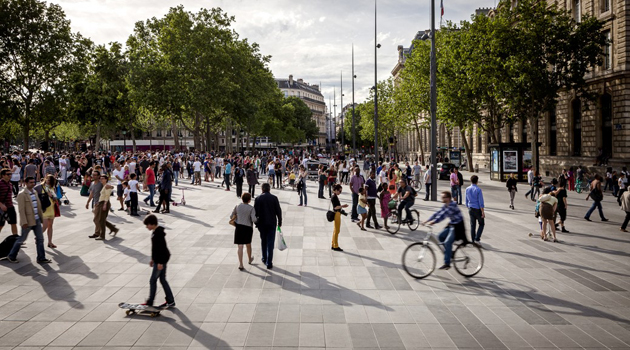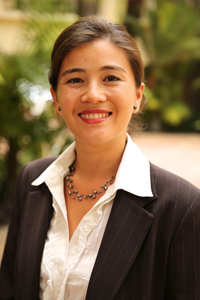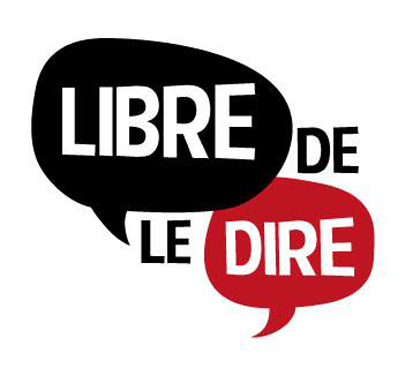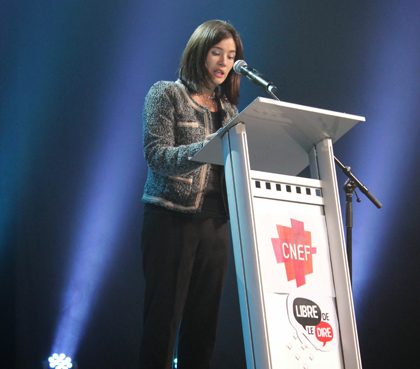In France, the timely “Libre de le dire” campaign adds an Evangelical voice to the debate about freedom of religion and ‘Laicité’. Jurist Nancy Lefèvre thinks the pressure from politicians and the media causes Christians to be “unsure about their rights”.
 Place de la République. / Pierre Yves Brunneau
Place de la République. / Pierre Yves Brunneau
France is in the midst of a major debate about freedom of speech in the media, in schools and on the street, and about how people with faith convictions should express their ideas in the public arena.
The Paris shootings against Charlie Hebdo and the Kosher supermarket are fuelling this conversation about freedom of speech, a topic which French Evangelicals had been reflecting on some time before the Islamist attacks.
French Evangelicals united in the CNEF (National Council of Evangelicals in France) launched a campaign named Libre de le dire in May 2014.
“Wherever you are, you have the right to speak”, was one of the central ideas of the initiative which wanted to reassure Christians and people of other faiths. Their aim was not to ask for new rights, but to make sure every citizen in France understands that freedom of conscience and religious freedom are not privileges but rights that are to be fully used in the work-place, in school, in public places, at church or at university.
POLITICIANS AND MEDIA “REDIFINING” FREEDOM OF RELIGION
 Nancy Lefèvre
Nancy Lefèvre“Freedom of religion tends to be ‘redefined’ as a very narrow right which only covers freedom of worship and freedom to express one's religion in the private sphere (meaning family, or within the religious community),” explains Nancy Lefèvre, a jurist of the CNEF who is leading the Libre de le dire campaign.
“This freedom is largely underestimated,” thinks Lefèvre. In France, “the state and the media” pushed ideas which “come in contradiction with the legal definition of freedom of religion and belief as established under international standards –article 18 of the UN Universal Declaration of Human Rights, article 9 of the European Convention on Human Rights- or under French Law, the ‘Declaration des Droits de l'Homme et du Citoyen’… and even under the Laicité principle”.
This does not mean French Christians are being persecuted like in other places. “We are not talking about persecution in France and Christian are no victims, like persecuted believers in Eastern Europe for instance. Obviously the threats to freedom of speech and freedom of religion are more subtle in France that in other countries where violations thereof are directly threatening people's life and security”.
WHAT IS ‘LAICITÉ’?
The main problem is how the very French concept ‘Laicité’ has been evolving. There is a “wrong idea that is largely confusing French people about freedom of religion,” argues Lefèvre. Its original definition refers to the separation of the state and religions, “which is a guarantee of freedom of religion, pluralism and neutrality of the state”.
But nowadays the concept has been used by secularists who think this neutrality “should extend to the citizens or the people living on French soil themselves”. But reality is that “neutrality, as a legal consequence of ‘Laicité’, applies to the State and to civil servants, not to people,” clarifies the jurist.
“These misconceptions lead to a chilling effect as people are unsure about their rights and as society wrongfully imposes neutrality where freedom of religion should prevail,” alerts Lefèvre.
‘JE SUIS CHARLIE’ VS. CHRISTIAN FREEDOM OF SPEECH
Freedom of Speech has been vividly defended after the Charlie Hebdo terrorist attacks in Paris.
“Unfortunately, this defence, largely endorsed by French people under the ‘Je suis Charlie’ motto, did not cover the defence of the expression of all opinions”, evangelicals in France are realising.
“Did it cover the freedom of all, or only of those who can criticise, offend or worry the religions or their institutions? Did it defended to the same extent the expression of opinions that could be less popular, as the ones of Christians, or of organisations like churches or ‘La Manif pour Tous’ opposing same sex marriage, surrogacy or euthanasia, or the freedom to speak about one's faith, to explain it and to try to convince other people thereof?”, asks Lefèvre.
The climate has been changing in the last years, and “these misconceptions or narrow understanding of these fundamental freedoms have detrimental consequences”. French society has come to the point, argues the CNEF, in which “people fear to exercise their freedom of speech and freedom of religion to their full extent...the rights are therefore directly threatened because they diminish in practice by society standards”.
THE CAMPAIGN
Libre de le Dire started publicly 10 months ago, but “in 2015, it appears as fully in line with French news”, says Lefèvre.
“This shows how relevant CNEF was when we prepared the campaign, back in 2013. It all started with the growing awareness of CNEF leaders about the gap between the law and how it was understood, about the potential threats and the great need of legal security and education on these crucial themes.”
 Libre de le dire logo.
Libre de le dire logo.This is combined with the “desire of the CNEF to secure the best conditions for spreading and living the Gospel in France, as well as being peace workers for our country.”
The French evangelicals had already published a book on Laicity (‘La Laicité Française: entre l'idée, l'histoire et le droit positif’, BLF) in 2013, which clarified ideas and gave pratical answers to 10 FAQs about laïcité.
“The ‘Libre de le Dire’ campaign comes in the same perspective: coming back to the legal principles, outside polemics, to inform, clarify, give some clues and go against confusing ideas”
EVANGELICALS SHOULD FIND “WIN-WIN” SOLUTIONS
All this is done is done in positive mood. “Freedoms of expression and religion are positive! They should not be considered as a threat but as positive elements of society. Our attitude is first not to under- or over- estimate the problems, so we try to address the issue with a non-polemical tone,” says Lefèvre.
“We wish to shade a different light on the issue so that public opinion, the media, public official understand better how to address them in a peaceful way, in a win-win solution. A key element of the campaign is to foster tolerance: we must acknowledge that our society is diverse, everybody does not share the same set of ideas, religious beliefs, opinions, questions of conscience... Let's consider how we can live together with a maximum extent of freedom of religion and expression instead of pressing everyone towards forced and artificial conformity”.
FIGHTING FOR THE RIGHTS OF ALL, NOT ONLY FOR CHRISTIANS
The CNEF's view of social action is that it should ont only serve to their own cause, but achieve goals for all of society. “We promote freedoms of expression and religion for all, not only for Christians,” says Lefèvre. “The issue goes far beyond our own concerns, it impacts French society as a whole...believers and non believers”.
This means the website, the initiatives, the ideas of the campaign are communicated to “public opinion, both internally, meaning CNEF members, Christian Evangelicals but also other believers from other confessions or religion, atheists, secularists”, plus “the media, public officials and politicians.”
 Lefèvre speaking about freedom of speech in the last CNEF convention. / CNEF
Lefèvre speaking about freedom of speech in the last CNEF convention. / CNEFNewspapers and online portals have reacted to the campaign. Media like Le Parisien, Le Point, La Croix, la Vie, Christianisme Aujourd'hui have covered the campaign.
HOW TO GET INVOLVED
Lefevre finally encourages everyone to get involved “creatively”, promoting the “Libre de le dire” spirit: “Tell us what you think about it, give us some input (your stories, good or bad!), help us meet strategic people… we would love to have Libre de le dire more active on social networks”, says Lefèvre.
One last questions is if the initiative could be used in other European countries too. Yes, one “could think of ways to export the Libre de le dire concept to your country”, agrees Lefèvre.
“Start thinking of your key issues, your key elements, key people” and “of course, pray for the development of Libre de le dire!”.
You can learn about the “Libre de le Dire” website, on the CNEF’s website and on the CNEF’s Facebook account.

Las opiniones vertidas por nuestros colaboradores se realizan a nivel personal, pudiendo coincidir o no con la postura de la dirección de Protestante Digital.
Si quieres comentar o